Information publishers have been working tougher than ever to squeeze search visitors out of Google.
Simply when editors begin to really feel assured that they’ve perfected a successful search engine optimization method, the sport adjustments. From supposedly “helpful” algorithm updates to web site repute insurance policies enforced by handbook actions to the lurking menace of AI Overviews, the strain is fixed.
And now, a brand new problem has landed in our laps: the unprecedented surge in competitors from worldwide publishers in Google’s Prime tales carousel.
Prime tales: Have the principles modified?
The dramatic shift in information manufacturers gaining visibility in Google’s Prime tales was inconceivable to disregard in the course of the British Common Election.
On the large day, a seek for “general election updates” in London revealed that The Hindu, an Indian English-language newspaper and The Washington Publish, a U.S. each day, have been outranking each single British writer – together with the BBC.
When trying to find different aggressive phrases like “Keir Starmer,” the highest search end result was an article by The Occasions of Israel, an Israeli multi-language on-line newspaper.
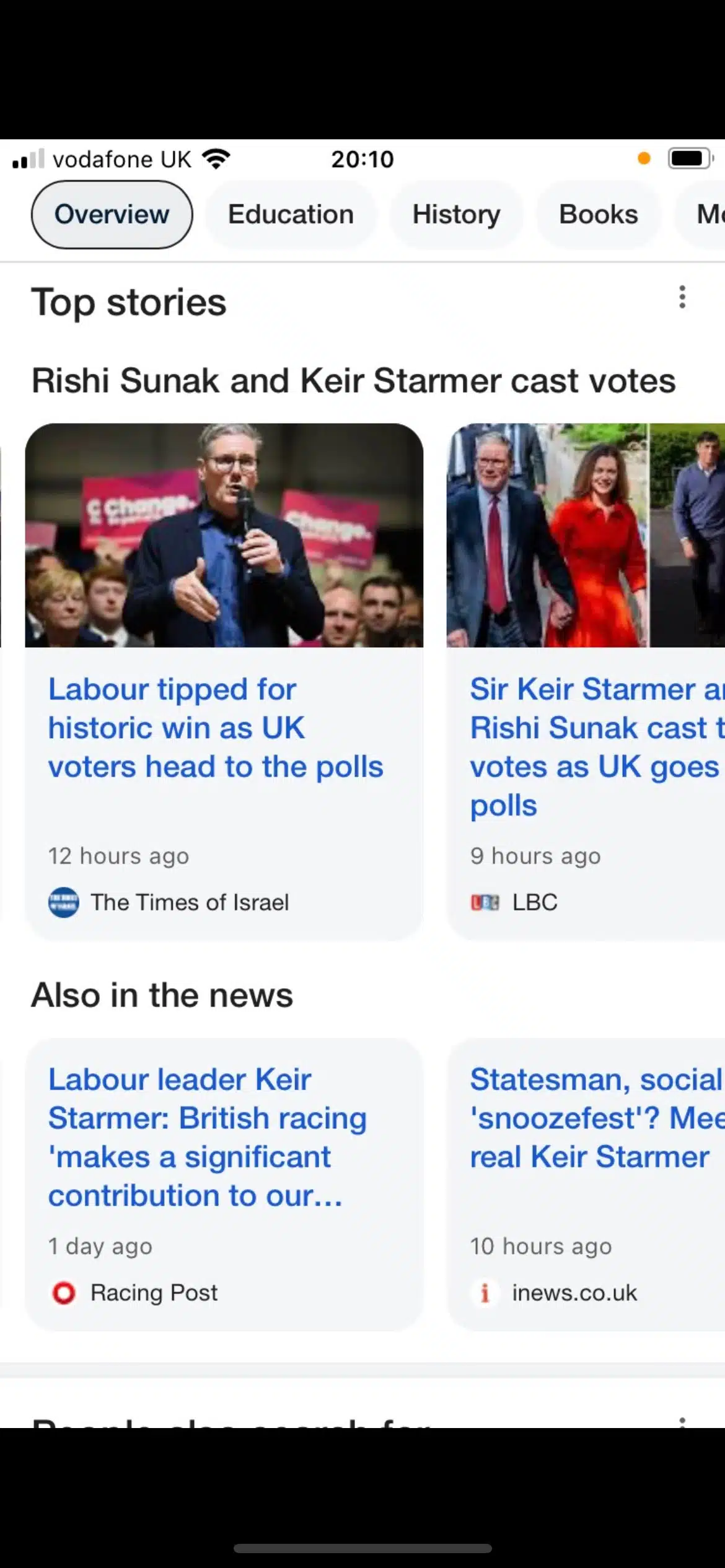
SEOs debated what could be inflicting this shift. Was Google attempting to supply UK-based readers with a broader vary of opinions with much less political bias? Presumably.
Nevertheless, this principle didn’t maintain up when, only a few days later, a Google seek for “Prince William” returned solely worldwide publishers within the Prime tales carousel, together with the Hindustan Occasions, an Indian English-language each day, Individuals, an American weekly journal and Mint, an Indian enterprise and monetary each day.
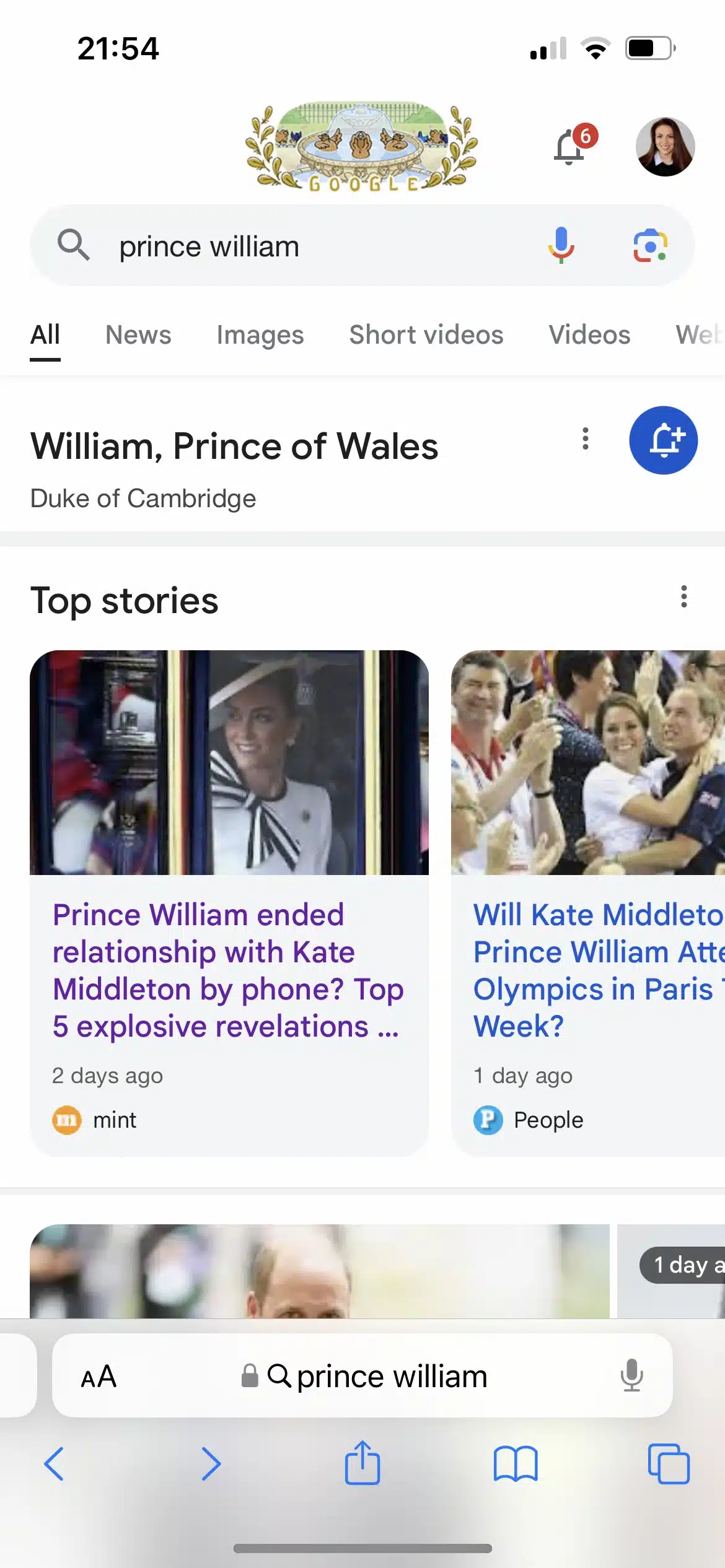
The difficulty took a weird flip a number of weeks later when riots erupted throughout the UK in one of many greatest and most surprising information tales of the 12 months.
This time, worldwide publishers not solely dominated the Prime tales carousel but in addition led Native information, with NDTV, an Indian information media firm and The New York Occasions, an American each day newspaper, rating highest in a carousel actually labeled “near England” by Google.
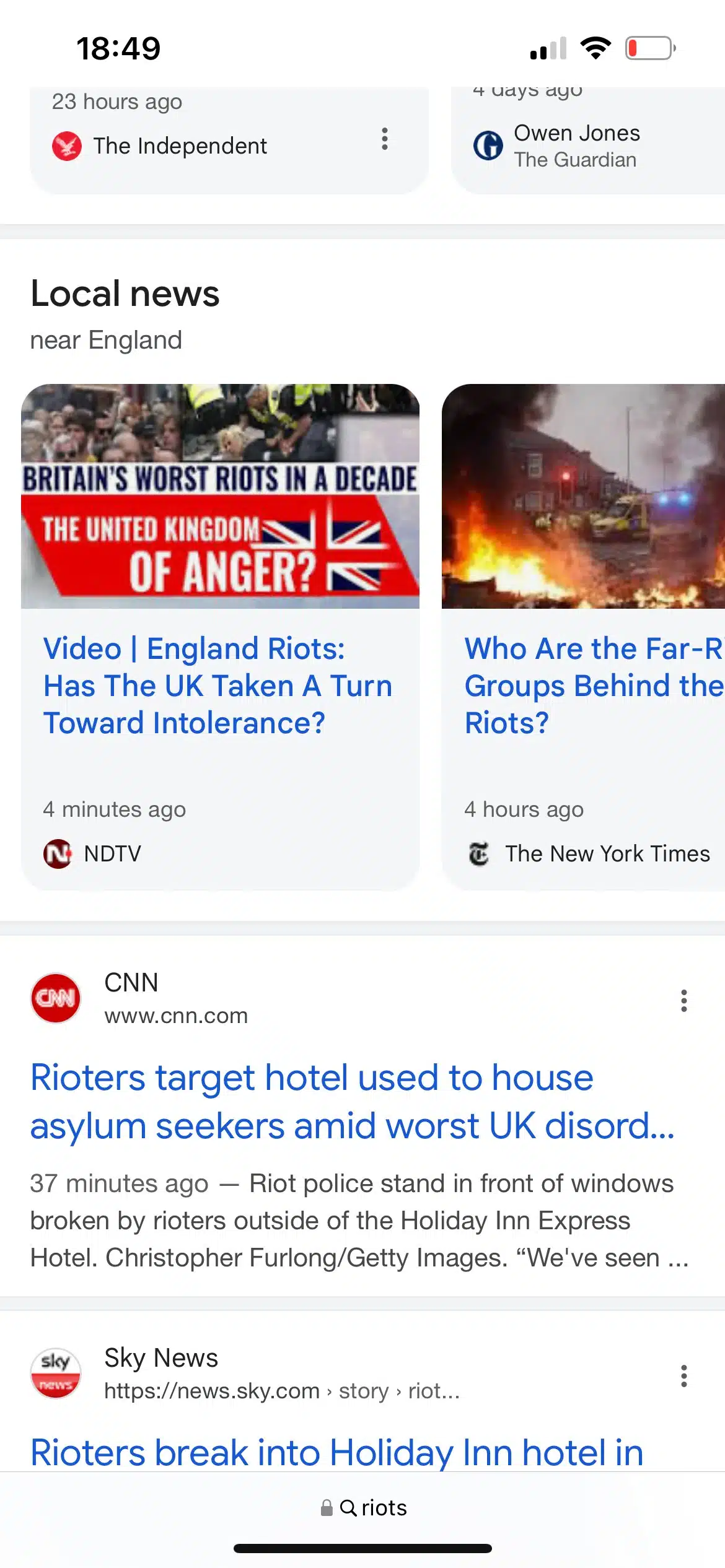
Dig deeper: Tips on how to grasp Google Information optimization to spice up content material visibility and visitors
‘Publishers can’t afford for Google to get this mistaken’
It seems this concern isn’t restricted to British information publishers. Lily Ray, VP of search engine optimization technique and analysis at Amsive, has been monitoring related issues within the U.S. for the previous 12 months and sharing her findings on X.
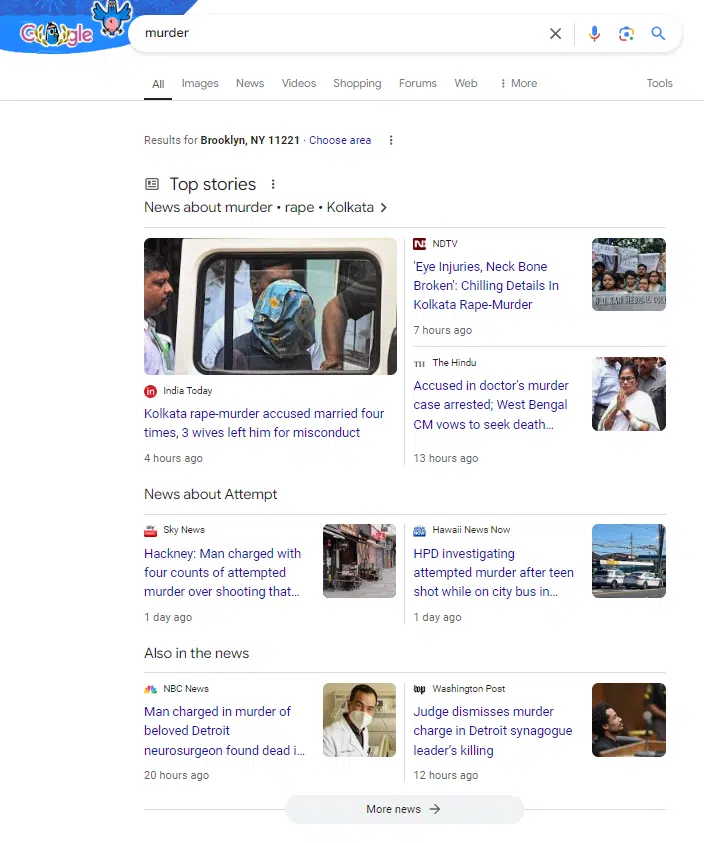
- “This problem seems to be getting worse over time,” Ray instructed me.
- “When I post about confusing international results, I get messages from people seeing the same thing all over the world. People in Brazil are seeing Portuguese websites. People in Mexico are seeing websites from Argentina.”
- “It’s not just an English-language site issue and the content often doesn’t make sense for local readers. I know this has been a problem for a while, but it seems to be getting worse recently.”
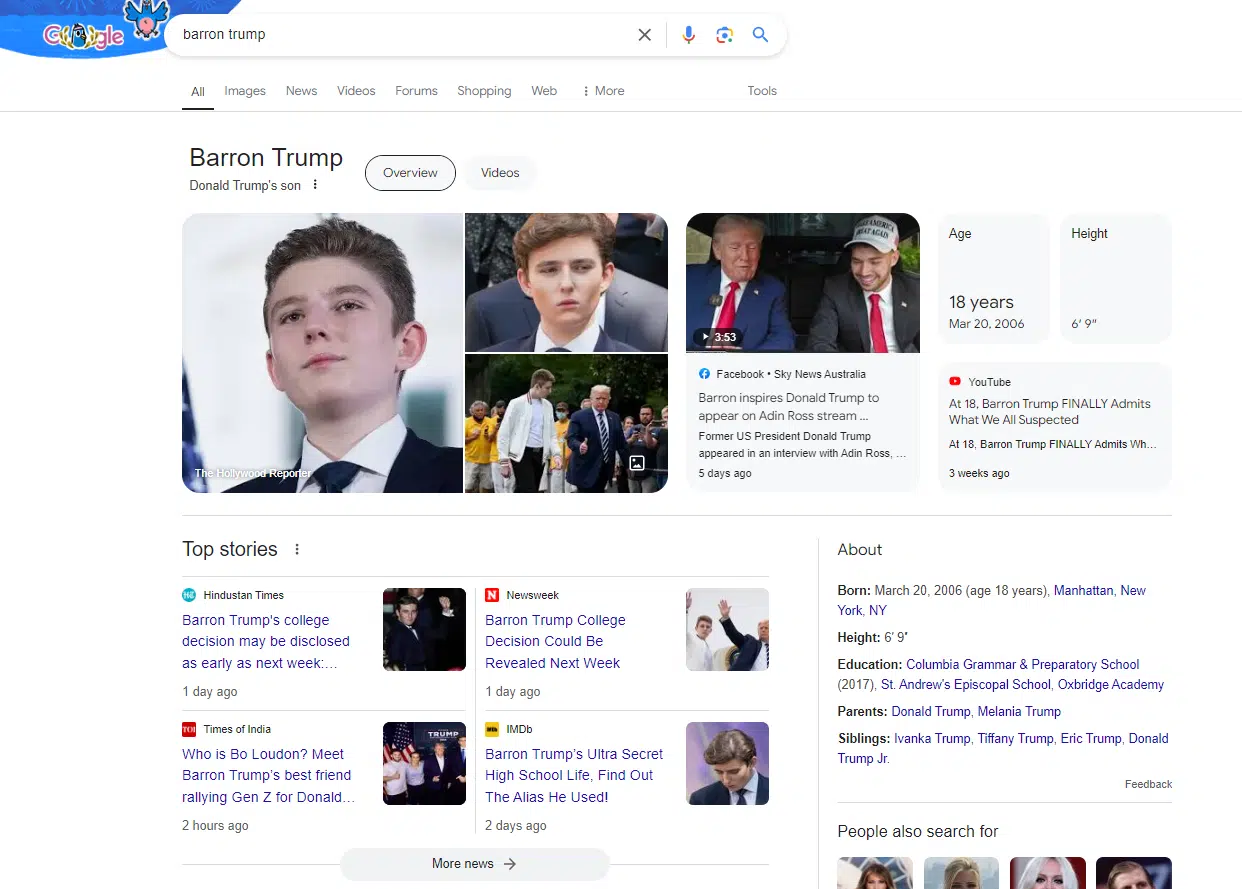
Rewarding worldwide publishers with visibility for native information searches impacts information manufacturers and creates a poorer consumer expertise.
- “It’s a zero-sum game when non-U.S. news publishers get to appear in the Top stories news carousel for the British or U.S. election for searchers in those respective regions,” Ray explains.
- “You have to remember, there are only around ten or fewer slots available – and things like elections are one of the most significant events in the news calendar. Giving one or two of those slots away is devastating. Many news publishers cannot afford for Google to get this wrong.”
Bringing the information to the desk
Knowledge from NewzDash helps the idea that worldwide publishers have seen a big improve in visibility within the Prime tales carousel, each within the U.S. and the UK.
The device, based by John Shehata, the previous international VP of viewers improvement at Condé Nast, calculates search visibility for SERP options like Prime tales by analyzing components comparable to rating place, estimated CTR, rating period and the variety of ranked URLs.
In line with NewzDash:
- The Occasions of India’s visibility within the Prime tales carousel within the U.S. elevated fourfold for the reason that finish of November 2023. This implies they’re now receiving 4 occasions the visitors they beforehand did in Prime tales for main trending information key phrases.
- The Occasions of India doubled its visibility year-on-year within the Prime tales carousel within the UK.
- The New York Occasions’ visibility within the UK’s Prime tales carousel elevated 121.74% year-on-year.
- The Washington Publish and NDTV each greater than doubled their visibility year-on-year within the British Prime tales carousel.
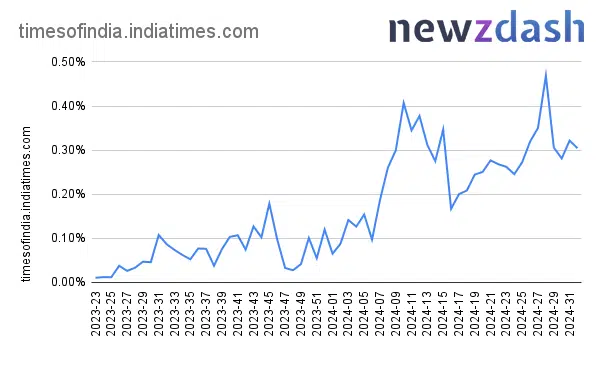
Commenting on the unprecedented surge in visibility for worldwide publishers, mixed with the myriad different challenges information publishers are at present going through, Ray tells me:
- “This has been the hardest year of my career. Normally when people ask me for advice, I say, ‘These are Google’s guidelines, this is how Google works and if you do a better job of following these guidelines, you’re more likely to succeed.’ But for the last eight months, I haven’t been able to confidently do that.”
- “I just hope that eventually, Google figures this stuff out. They always do. We just have to understand that things are a bit broken right now.”
Google confirms the difficulty – nonetheless, there’s a ‘but’
Right here’s the excellent news: Google tells me there is a matter on their finish that they’re addressing. A spokesperson wrote in a press release:
- “We are aware of an issue that’s leading to the display of non-local news sources in the Local News block on Search for a small number of users. We’re working on an update to address it.”
The not-so-good information? The spokesperson fairly clearly solely addresses the problems with Native information carousels – not Prime tales.
Though Google’s pointers state that its search algorithms take into account a consumer’s location to ship probably the most related data, worldwide publications that cowl international matters should still get visibility in a Prime tales carousel if Google’s programs deem the content material authentic, useful and high-quality.
Commenting on Google’s response, NewzDash founder Shehata says the growing presence of worldwide publishers in Prime tales carousels indicators a deeper drawback. He explains:
- “Google’s recognition of the Local News issue is positive, but the effect on Top stories is equally troubling. When publishers are already grappling with financial challenges, each ranking lost to a non-local/national site directly impacts their revenue.”
- “While we must acknowledge the global reach of news consumption, local context and relevance must remain a top priority in Top stories ranking algorithms.”
- “Google needs to improve its algorithms to strike a better balance, one solution is to provide international sites as a secondary Top stories carousel like what they do on Local Top stories.”
- “Another area where we see a rise in international sites is Translated Results, where Google might translate search results that are not in the same language as the search query, if available. However, this also raises questions about how effectively Google’s algorithms are weighing the relevance and authority of these translated results against local sources.”
‘Publishers can’t be hypocritical’
Though this can be a bitter tablet for some media retailers to swallow, Barry Adams, award-winning search engine optimization guide and founding father of Polemic Digital, means that U.S. and UK publishers might have themselves in charge.
- “Let’s face it, this setup is benefitting British and American publishers too,” he explains.
- “The Daily Mail is the tenth largest news website in the U.S. But all of a sudden, this is happening in our own backyard and it’s a problem? We need to make sure we’re not being hypocritical.”
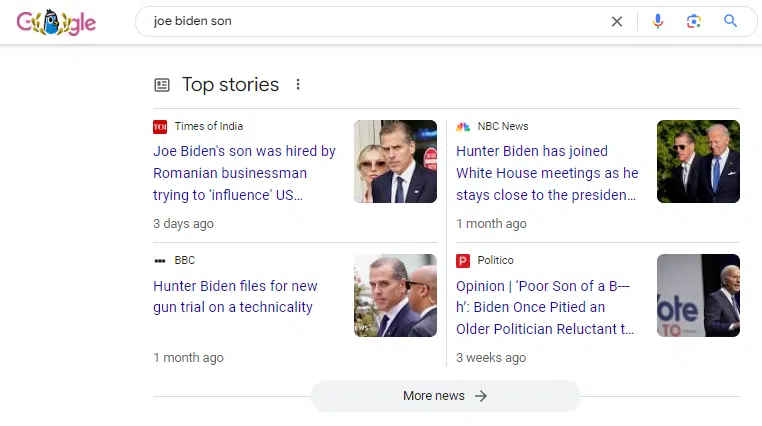
Adams factors out that many U.S. and UK publishers have made a aware resolution to focus on worldwide audiences by making their content material much less U.S. and UK-centric. In doing so, these information retailers have opened the doorways for different international publishers to come back into the U.S. and UK market.
- “We can blame Google a little bit because something weird is going on,” says Adams.
- “Google needs to work harder at understanding what country a website belongs to – not necessarily to limit that publisher, but to make sure that a locally focused publisher is given preference over a website from a foreign country.”
- “Publishers like The Times of India do have every right to be in our Top stories carousels. I don’t think people realize how long these brands have been around for and how much readership they have – we’re talking about a 1.3 billion reader market.”
- “Think of the sheer volume of links and citations they would have accumulated over the years. So we can’t be surprised when they appear in Top stories – but this should be some of the time and they shouldn’t be the primary news source in London for the UK General Election.”
Placing journalism first
Though Google has traditionally been thought-about a extra secure visitors supply for publishers, it may be as unpredictable as social.
Given this volatility, it’s not stunning that conventional internet search now accounts for simply 36% of publishers’ Google visitors, down from 46.5% final 12 months, in accordance with new analysis from NewzDash.
In the meantime, the share of visitors from Google Uncover jumped from 41.6% to 55.6% of publishers’ complete Google visitors – a 14% improve.
With these statistics in thoughts, how can information publishers future-proof their firms in an more and more aggressive search surroundings?
- “The worst mistake a publisher can make is chasing after Google clicks,” concludes Adams. “It might work in the short-term, but in the long run, you need to build a unique news brand.”
- “The best approach for news publishers is to focus on the quality of your journalism, strengthen your brand’s identity and prioritize building a secure audience.”
Dig deeper: An search engine optimization information to optimizing your Google Writer Heart account
Contributing authors are invited to create content material for Search Engine Land and are chosen for his or her experience and contribution to the search neighborhood. Our contributors work underneath the oversight of the editorial employees and contributions are checked for high quality and relevance to our readers. The opinions they specific are their very own.

